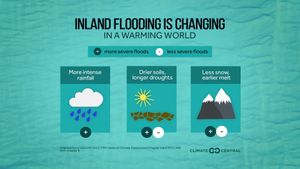The Trump administration's recent decision to implement hefty tariffs on imports from Canada and Mexico is set to shake up the automotive industry, particularly impacting electric vehicle manufacturers like Tesla. Starting Tuesday, U.S. President Donald Trump enforced a 25% tariff on imports from these neighboring countries, justifying this move by pointing to issues related to drug trafficking and large trade deficits.
This new policy has already caused significant tremors across the auto sector. Flavio Volpe, President of Canada’s Automotive Parts Manufacturers’ Association, voiced his concerns about the repercussions, stating, "The auto sector is going to shut down within a week." Meanwhile, local union representatives, such as John D’Agnolo, warn of the impending job losses, noting, "We’re talking about thousands and thousands of jobs being lost" throughout key manufacturing hubs like Windsor, Ontario, and Detroit.
The tariffs are predicted to send vehicle prices soaring across the United States and Canada, with analysts from Wolfe Research projecting the average price of new cars could rise by about $3,000. This is particularly challenging for Tesla, whose Canadian customers have already seen price increases of up to $9,000 Canadian dollars (approximately $6,189 USD) on several models, including the popular Model 3.
Canada has responded to these U.S. tariffs by announcing its own 25% tariffs on $155 billion worth of U.S. goods, asserting the intent to protect its businesses. This retaliation complicates matters for Tesla, which previously relied on its U.S. factories for its entire lineup delivered to Canadian consumers. Electric vehicle enthusiasts may find their options steadily dwindling as these new trade barriers discourage affordability.
Lower-cost Chinese electric vehicles are already facing restrictions due to existing tariffs, which means Tesla and other U.S. imports are now subject to hefty tariffs as well. The impact does not only touch Tesla, but also extends to automakers like Ford and General Motors, amplifying potential price hikes for vehicles across the board.
Makers of vehicles have been scrambling to adjust their supply chains as they cope with these new tariffs. GM CEO Mary Barra stated, "We are working across our supply chain, logistics network, and assembly plants so we are prepared to mitigate near-term impacts," indicating the urgency to protect profitability amid rising costs.
Industry insights suggest the tariffs could lead to stretched production lines, and industry experts indicate the potential of massively reduced production volumes. According to Michael Robinet, Vice President of forecast strategy for S&P Global Mobility, "We expect production and sales would go down," painting a dire picture of the industry as it attempts to navigate through these uncharted waters.
On the other hand, auto manufacturers who retain production plants within Canada, such as Stellantis and others, may see advantages as their vehicles remain tariff-free, attracting Canadian buyers facing increased costs for U.S. imports.
Interestingly, throughout Trump's initial push for tariffs, he emphasized the need to boost American manufacturing, arguing the U.S. could become self-sufficient and lessen its dependency on cross-border trade. Though many have condemned the move as potentially undermining the competitive edge of American automakers, the repercussions continue to ripple throughout North America.
All eyes remain on the White House as the full scope of these tariffs begins to take effect. Will the U.S. auto industry weather this storm and emerge strong, or will job losses and decreased production levels send shockwaves throughout communities dependent on automotive manufacturing?



